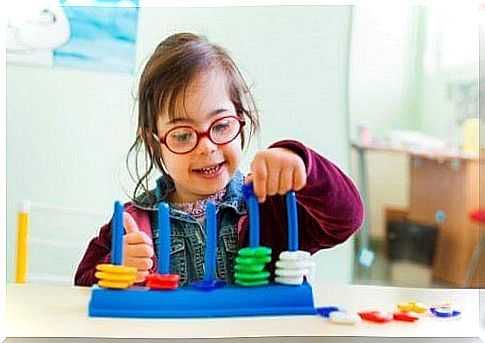Educating Children With Down Syndrome

Children with Down syndrome have the same needs as any other child and should be treated as such. But how to educate children with Down syndrome in a correct and healthy way?
First of all, good communication is essential. Parents must pay attention to the health of their children and this also means guaranteeing them proper nutrition. In addition to this, the support of the whole family must never be lacking.
But to educate children with Down syndrome, more is needed. For example, fostering activities that allow them to develop skills and talent.
What is Down’s Syndrome?
Down syndrome is a genetic alteration due to a third copy of chromosome 21. It affects 1 in 1000 newborns and is considered one of the most common abnormalities worldwide.
The causes of Down syndrome are not very clear. Some cases are related to the genetic makeup of the individual, while others are associated with the age of the mother. Finally, there is no exact cause.

Babies with Down syndrome share certain physical traits such as almond-shaped eyes, mouth, lips, and small ears. Their personalities, on the other hand, can differ greatly.
Their ways of learning and their sense of humor can also be different. In any case, there is no doubt that they enjoy great emotional intelligence and love to express affection.
How to educate children with Down syndrome?
Parenting a child with Down syndrome is a positive adventure. Especially at the beginning, however, it will be necessary to try to understand this disorder better, in order to get to know it thoroughly.
If your children have Down syndrome, don’t be afraid. Their upbringing may be conventional, especially if accompanied by your and the whole family’s affection.
To educate children with Down syndrome in a healthy and correct way, it is good to keep in mind some valuable tips. The key is to understand that they are totally normal kids, so they should be treated as such. You have to show optimism and be understanding. As always, the idea is to pass on to your children all the love we feel for them.
The importance of communication
Good communication between parents and children is extremely important. In this particular case, more attention will need to be paid to their way of expressing themselves.
Children with this disorder usually take longer to acquire speech. Likewise, they may present with language and communication difficulties. No problem: be patient and find alternative ways to understand children effectively.
Interaction with siblings and other children

The complete development of a Down child can take place at different times, but this does not affect their way of relating to the world around them. Interacting with siblings or other children will greatly ease the situation.
Try to make your children interact with adults as well, especially those who are part of your life. Getting children into contact with other people and encouraging them to share their ideas will make them feel good. At the same time, your social circle will become familiar with the little one.
Conventional or special schools?
A child with Down syndrome can easily go to a regular school. This choice will favor social integration with other children, with or without the syndrome. This will increase the child’s self-esteem, gain confidence, and help him bond with anyone.
The child with Down syndrome is likely to have a different rhythm than their classmates. Thanks to the help of the teacher and the collaboration of mom and dad with homework, this “gap” can easily be filled. Do not forget that their development phases follow a particular process.
Other activities and sports to educate children with Down Syndrome

Each individual has skills and talents. Children with Down syndrome often display amazing abilities. Also keep in mind that I am capable of any activity, hobby or sport. It’s just about encouraging them to engage in activities that they enjoy and show a strong aptitude for.
1. Art
Painting, music, dance and other arts can be very helpful in developing the emotional intelligence of children with Down syndrome. Enrolling them in dancing, singing or acting will help them let their imaginations fly as they learn and grow.
2. Sports
Sports activities are very popular with children with Down syndrome. They improve their physical conditions, learn to work as a team and to commit themselves to achieve results. Playing sports really offers a lot of benefits.
The disciplines of short duration and which involve frequent breaks are particularly suitable. Among the most recommended sports are:
- I swim.
- Football.
- Rhythmic gymnastics.
- Basketball.
- Table tennis.
- Martial arts.
3. Educate children with Down syndrome through play
Every child needs fun and entertainment to develop optimally. It is important that children with Down syndrome also have a space to play and keep toys.
By playing together, you will be able to pass on valuable lessons to them; moreover, the game will act as a useful tool to stimulate their motivation.
Pay attention to nutrition, why?

The nutrition of children with Down syndrome should be monitored at all stages of growth. Babies who show this change usually need more time to learn to latch on to the breast or to drink from a bottle. You will need to be patient and always encourage the baby to adapt to various feeding methods.
Even more so than other children, it is important that they eat a balanced and healthy diet. In fact, Down children can be prone to overweight problems due to their shorter stature and because their physical activity tends to be below average.
The health of children with Down syndrome
A sizeable percentage of children with Down syndrome can suffer from heart ailments. It is estimated that 45% of these children suffer from heart disease. Likewise, they can have lung problems, not at random, they very often have a cold.
Another common health problem is the weakening of the hearing system. Visual abnormalities are also common, such as cataracts, myopia or strabismus. Bowel disease can be recurrent, as some babies are born with bowel malformations.
There is no reason to be alarmed, because all these diseases can be cured, but it is important to prevent and ensure effective treatments. To do this, consult your doctor regularly and always keep an eye on the health of your child.
Conclusions
Raising a child is never easy, whether with Down syndrome or not. Many families consider this experience a real challenge, but it is only necessary to follow common sense and rely on good specialists and other people who are in the same situation.
To ensure a healthy and complete development for your children, just follow a few tips and give them all the love and support they need. The efforts and sacrifices will be daily there is no doubt, but they will be amply rewarded by their smiles.









